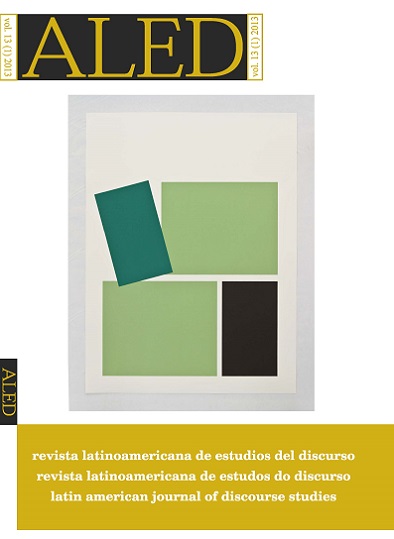Redes de metáforas cognitivas en el discurso político
“el socialismo del siglo XXI” de Hugo Chávez
Keywords:
metaphor networks. semantic families. political discourse. socialism. Hugo Chávez.Abstract
Cognitive metaphors are extensively studied in linguistics (Gibbs, 1999), particularly in the field of political discourse (Chilton & Ilyin, 1993) and although Chumaceiro (2004) has developed a first approach to metaphors as semantic groups, the study of metaphors as networks remains greatly unexplored in Spanish. For this reason, the purpose of this article is to analyze metaphor networks associated with the notion of ‘socialism’ in the discourse of President Hugo Chavez. The work is framed by Lakoff and Johnson ([1980] 2007) cognitive perspective and linguistic analysis, according to Cameron (1999). The corpus consists of four broadcasts of the television program Aló Presidente in 2005. First, metaphors are identified following Lakoff and Johnson’s categories; then the network of meanings in the metaphors are identified and reorganized. The results of the analysis unveil the presence of eight central networks. We conclude that the networks of metaphors built into political discourse are associated and combined as semantic families according to ideological purposes to show how socialism of the XXI century is conceived.
Downloads
References
ADRIÁN, T. (2010). La metáfora conceptual en el discurso político venezolano: Rómulo Betancourt y Hugo Chávez Frías. Revista de la Asociación Latinoamericana de Estudios del Discurso, 10 (1): 9-33.
ADRIÁN, T. (2009). La metaforización en el discurso político venezolano: Rómulo Betancourt y Hugo Chávez. Tesis doctoral. Universidad Pedagógica Experimental Libertador. Instituto Pedagógico de Caracas.
BLACK, M. (1999). Metáfora, en L. M. Valdés Villanueva (Comp.) La búsqueda del significado, pp. 564-583. Madrid: Tecnos.
BOLÃVAR, A. (2007). El análisis interaccional del discurso: del texto a la dinámica social, en A. Bolívar (Comp.) Análisis del discurso. ¿Por qué y para qué?, pp. 247-277. Caracas: Los Libros de El Nacional y la Universidad Central de Venezuela.
BOLÃVAR, A. (2003). Nuevos géneros discursivos en la política: el caso de Aló presidente, en L. Berardi (Comp.) Análisis crítico del discurso. Perspectivas latinoamericanas, pp. 101-130. Santiago: Frasis editores.
BOLÃVAR, A. (2005). Discurso e interacción en el texto escrito. Caracas: Consejo de Desarrollo Científico y Humanístico. Universidad Central de Venezuela.
CAMERON, L. (1999). Operationalising “metaphor” for applied linguistic research, en L. Cameron y G. Low (Ed.) Researching and applying metaphor, pp. 3-28. Cambridge: Cambridge University Press.
CAÑIZÁLEZ, A. A. (2011). Medios, gobernabilidad democrática y políticas públicas. La presidencia mediática: Hugo Chávez (1999-2009). Tesis doctoral. Doctorado en Ciencia Política. Caracas: Universidad Simón Bolívar.
CAMERON, L. y LOW, G. [ed.] (1999). Researching and applying metaphor. Cambridge: Cambridge University Press.
CHARAUDEAU, P. (2009). [En línea]. Reflexiones para el análisis del discurso populista, Discurso y Sociedad, 3(2): 253-279. Disponible en: http://www.dissoc.org/ediciones/v03n02/DS3%282%29Charaudeau.pdf [Consultada el 19 de diciembre de 2009].
CHILTON, P. e ILYIN, V. (1993). Metaphor in political discourse: The case of the “Common European House”. Discourse and Society, 4 (1): 7-31.
CHUMACEIRO, I. (2004). Las metáforas políticas en el discurso de dos líderes venezolanos: Hugo Chávez y Enrique Mendoza. Revista de la Asociación Latinoamericana de Estudios del Discurso, 4 (2): 91-113.
CUENCA, M. J. y HILFERTY, J. (1999). Introducción a la lingüística cognitiva. Barcelona: Editorial Ariel, S.A.
CUVARDIC GARCÃA, D. (2005). [En línea]. La metáfora en el discurso político. Revista Reflexiones, 83 (2): 61-72. Disponible en: http://reflexiones.fcs.ucr.ac.cr/documentos/83_2/la_metafora.pdf. [Consultada el 12 Noviembre 2008]
DAVIDSON, D. (2001). De la verdad y de la interpretación. Fundamentales contribuciones a la Filosofía del Lenguaje. Barcelona: Gedisa.
DUARTE, M. (2011). Las metáforas cognitivas en torno a la noción de “socialismo” en Aló Presidente. Tesis de Maestría. Universidad Central de Venezuela, Caracas.
GIBBS, R. (1999). Researching metaphor, en L. Cameron y G. Low (Ed.) Researching and applying metaphor, pp. 29-47. Cambridge: Cambridge University Press.
GUALDA, R. (2012). The discourse of Hugo Chávez in Aló Presidente: establishing the Bolivarian revolution through television performance. Tesis doctoral. Universidad de Austin, Texas.
GUERRA, J. (2007). ¿Qué es el socialismo del siglo XXI? Caracas: Librorum Editores.
HALLIDAY, M. A. K. (1994). An introduction to functional grammar. London: Edward Arnold.
HALLIDAY, M. A. K. y HASAN, R. (1977). Cohesion in English. London: Longman.
HERNÁNDEZ, M. L. (2004). [En línea]. La metáfora política en la prensa venezolana: un estudio lingüístico cognitivo. Opción, vol. 20 (44): 55-77. Disponible en: http://www.scielo.org.ve/scielo.php?script=sci_arttext&pid=S1012-15872004000200004&lng=es&nrm=iso [Consultada el 3 de febrero de 2010]
LAKOFF, G. (1991). [En línea]. La metáfora política. A parte rei (Carta abierta a Internet). Disponible en: http://serbal.pntic.mec.es/~cmunoz11/guerra.pdf [Consultado el 23 de noviembre de 2008]
LAKOFF, G., y Johnson, M. [1980] (2007). Metáforas de la vida cotidiana. Madrid: Ediciones Cátedra.
LÓPEZ MAYA, M. (2009). Ideas para debatir el socialismo del siglo XXI ”“Volumen II. Caracas: Editorial Alfa.
MC CARTHY, M. (1990). Vocabulary. Oxford: Oxford University Press.
MOLERO, L. (2009). La metáfora en el discurso político venezolano, en M. Shiro, P. Bentivoglio y Frances D. Erlich (Comp.) Haciendo discurso. Homenaje a Adriana Bolívar, pp. 305-332. Caracas: Comisión de Estudios de Postgrado y Facultad de Humanidades y Educación de la Universidad Central de Venezuela.
MORENO LARA, M. (2005). [En línea]. La metáfora conceptual y el lenguaje político periodístico. Configuración, interacciones y niveles de descripción. Tesis doctoral. Universidad de la Rioja-España. Disponible en: http://dialnet.unirioja.es/servlet/tesis?codigo=114 [Consultada el 15 de noviembre de 2008]
NIETO y OTERO, M. J. (2008). La vinculación afectiva en el discurso político. Tesis doctoral. Caracas: Universidad Central de Venezuela.
SPERBER, D. y WILSON, D. (1994). La relevancia. Comunicación y procesos cognitivos. Madrid: Visor.
Downloads
Published
How to Cite
Issue
Section
License

This work is licensed under a Creative Commons Attribution-NonCommercial-NoDerivatives 4.0 International License.
The authors retain the copyright and guarantee RALED the right to be the first publication of the work as well as a Creative Commons Attribution License that allows others to share the work with recognition of authorship and the initial publication in this journal.




